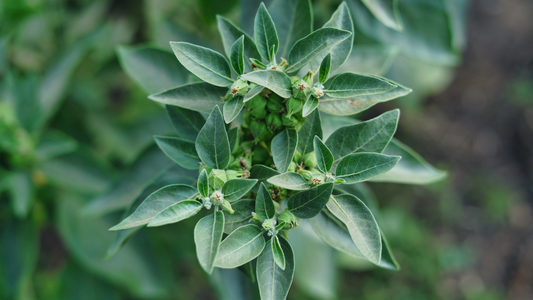- Blog
- Mumijo & Shilajit: Effects & Possible Side Effects

Mumijo & Shilajit: Effects & Possible Side Effects
Introduction: What are Mumijo and Shilajit?
Mumijo and Shilajit are fascinating natural substances that have been used for centuries in the traditional medicine of various cultures. Originally discovered in the mountainous regions of Central Asia, these dark, resinous substances have also gained attention in the Western world in recent years.
Mumijo, also known as Moomiyo or Mumiyo, is formed through a lengthy geological process in which organic material is decomposed and mineralized in rock crevices. Shilajit, the Sanskrit name for Mumijo, is often referred to as the "Conqueror of the Mountains and Destroyer of Weakness." This designation already suggests the diverse applications attributed to these substances.
In Ayurvedic and Tibetan medicine, Mumijo and Shilajit are considered panaceas used to strengthen the body and promote health. Modern research is now beginning to examine the potential effects of these natural substances more closely. A wide range of possible effects is emerging, ranging from immune system support to antioxidant properties.
Mumijo Effects: A Look at the Potential Benefits
The effects of Mumijo are the focus of numerous studies aimed at scientifically substantiating traditional applications. A wide range of potential effects is evident, which may be attributed to the diverse composition of this natural substance.
A special focus is on the possible supportive effect of Mumijo on the immune system. The contained minerals and trace elements could play a role in this. Some studies suggest that Mumijo may stimulate the production of certain immune cells. This could contribute to strengthening the body's defenses.
Furthermore, the potential antioxidant effect of Mumijo is being researched. Antioxidants can help reduce oxidative stress in the body and thus possibly prevent cell damage. A potential anti-inflammatory effect is also the focus of research. Initial studies provide evidence that Mumijo could influence certain inflammatory markers in the body.
It is important to emphasize that further research is necessary to fully understand and confirm these potential effects. However, the existing findings provide an interesting basis for future investigations into the effects of mumiyo.
Shilajit effects: What research says
The effects of Shilajit are being studied with growing interest in the scientific community. Current research findings provide interesting insights into the possible effects of this natural substance on various aspects of health. However, it is important to emphasize that many of these studies are still in early stages and further investigations are needed.
A focus of the research is on the potential energy-boosting properties of Shilajit. Some studies suggest that Shilajit may support the function of mitochondria, the powerhouses of our cells. This could contribute to improved energy production in the body. However, further investigations are necessary to confirm this hypothesis.
Also the possible effects of Shilajit on cognitive functions are the focus of research. Initial studies provide indications that Shilajit may influence memory performance and concentration ability. However, the exact mechanisms behind this are not yet fully understood and require further scientific investigation.
In addition, the potential effect of Shilajit on metabolism is being researched. Some studies suggest a possible influence on blood sugar levels and fat metabolism. These findings are promising but need to be further verified through more extensive clinical studies.
Mumijo Shilajit effect on health
Possible support for the immune system
The effect of Mumijo Shilajit on the immune system is the subject of current research. Both substances contain a variety of minerals and trace elements that may contribute to strengthening the body's defenses. Some studies suggest that Mumijo and Shilajit could stimulate the production of certain immune cells.
The fulvic acids contained in Mumijo and Shilajit could play a special role in this. These organic compounds may have the potential to improve nutrient absorption and thus indirectly support the immune system. Furthermore, it is suspected that the antioxidant properties of Mumijo and Shilajit could help reduce oxidative stress and thereby promote immune function.
It is important to emphasize that these potential effects still require further scientific investigation. However, the current findings provide an interesting basis for future research on the possible supportive effects of Mumijo and Shilajit on the immune system.
Potential effects on energy and vitality
The possible effects of Mumijo and Shilajit on energy and vitality are a fascinating area of research. Some studies suggest that these natural substances may support the function of mitochondria, the energy producers in our cells. This could contribute to improved energy production in the body.
The minerals and trace elements contained in Mumijo and Shilajit could play an important role. In particular, iron, which is important for oxygen transport in the blood, and magnesium, which is involved in numerous metabolic processes, could possibly contribute to an increase in vitality.
Some users report a feeling of increased energy and endurance after taking Mumijo or Shilajit. However, it is important to note that these subjective experiences need to be further investigated through controlled clinical studies to scientifically confirm the actual effects on energy and vitality.
Antioxidative properties
The antioxidant properties of Mumijo and Shilajit are the focus of numerous scientific studies. Antioxidants play an important role in protecting our cells from oxidative stress caused by free radicals. The compounds found in Mumijo and Shilajit, particularly fulvic acids and dibenzo-alpha-pyrones, may potentially exhibit antioxidant effects.
Some studies suggest that mumijo and shilajit may have the potential to support the body's own antioxidant defense mechanisms. This could possibly help prevent cell damage and influence the aging process at the cellular level. However, it is important to emphasize that further research is necessary to fully understand and confirm these potential effects.
The antioxidant properties of Mumijo and Shilajit may also be related to other potential effects, such as the possible support of the immune system or the promotion of skin health. Future studies will hopefully bring more clarity about the exact mechanisms and the full potential of these antioxidant effects.
Mumijo effect on hair: Can it influence hair growth?
The effect of Mumijo on hair is a topic that is receiving increasing attention in naturopathy and modern research. Traditionally, Mumijo is used in some cultures to promote hair health. However, scientific studies on this specific aspect are still limited, and further research is needed to confirm potential effects.
The minerals and trace elements contained in Mumijo could possibly play a role in hair health. In particular, iron, zinc, and copper are important for healthy hair growth. Some users report an improvement in hair structure and stronger hair growth after using Mumijo. However, it is important to emphasize that these experiences are subjective and need to be further investigated through scientific studies.
Interestingly, some preliminary studies suggest that the antioxidant properties of Mumijo may help protect the scalp from oxidative stress. This could indirectly support hair growth. Additionally, it is suspected that Mumijo could stimulate blood circulation in the scalp, which could also have positive effects on hair growth.
It is important to note that further clinical studies are necessary to comprehensively investigate and confirm the possible effects of Mumijo on hair growth. Until then, statements about the Mumijo effect on hair should be viewed with caution.
Mumijo effect on skin: A natural skincare booster?
The effect of Mumijo on the skin is a fascinating area of research that is gaining attention in both traditional applications and modern cosmetics. Mumijo has been used in some cultures for centuries to support skin health. However, the scientific investigation of these potential effects is still in its early stages.
The complex composition of Mumijo, particularly its content of minerals and trace elements, could possibly have positive effects on skin health. Some of these ingredients, such as zinc and copper, play an important role in skin regeneration and the production of collagen, a key structural protein of the skin.
The antioxidant properties of Mumijo could possibly help protect the skin from oxidative stress. Oxidative stress is considered a factor that can contribute to premature skin aging. Some users report an improvement in skin appearance and increased elasticity after using products containing Mumijo.
However, it is important to emphasize that further scientific studies are necessary to comprehensively investigate and confirm the possible effects of Mumijo on skin health. Until then, statements about the Mumijo effect on skin should be viewed with caution. If you wish to use Mumijo for skincare, it is advisable to first consult a dermatologist.
Shilajit Effect Testosterone: Influence on Hormone Balance
The effect of Shilajit on testosterone is a topic that is gaining increasing attention in research. Some studies suggest that Shilajit may have an influence on testosterone levels. Testosterone is an important hormone that plays a key role in various bodily functions in men, including muscle building, bone density, and libido.
Preliminary investigations suggest that the intake of Shilajit may lead to a slight increase in testosterone levels. It is suspected that certain ingredients in Shilajit could stimulate the production of testosterone in the testes. However, it is important to emphasize that these results still need to be confirmed by more extensive clinical studies.
Some users report an improvement in their physical performance and an increased sense of well-being after taking Shilajit. These subjective experiences may possibly be related to changes in hormone levels. However, it is important to view these reports critically and not to consider them as scientific evidence.
If you are interested in using Shilajit to support your hormonal balance, it is advisable to consult a doctor beforehand. They can assess your individual situation and inform you about potential risks and interactions.
Tips for intake and dosage
When taking Mumijo and Shilajit, it is important to keep in mind some basic tips to potentially benefit from the effects. The optimal dosage can vary individually and depends on various factors, such as your age, weight, and the reason for taking it.
In general, it is recommended to start with a low dose and gradually increase it until you find the amount that is right for you. Many manufacturers recommend a daily dose of about 300-500 mg for adults. However, it is important to emphasize that there is no universally applicable dosage recommendation that is scientifically confirmed.
The intake of Mumijo or Shilajit on an empty stomach in the morning is often recommended, as this may improve the absorption of the ingredients. Some users also report positive experiences when taking it before bedtime. It can be helpful to integrate the intake into your daily routine to avoid forgetting it.
It is important to note that Mumijo and Shilajit are not miracle cures and cannot replace a balanced diet and a healthy lifestyle. If you have questions about intake or dosage, it is advisable to consult a doctor or alternative practitioner who can provide individual advice.
Mumijo Shilajit Side Effects: What You Should Consider
Possible Mumijo Shilajit Side Effects
Although Mumijo has been used in traditional medicine for centuries, it is important to be informed about possible Mumijo side effects. In most cases, Mumijo is well tolerated, but some people may experience unwanted reactions.
Some users report mild digestive issues such as nausea or diarrhea, especially at the beginning of use. These symptoms usually subside after a few days. In rare cases, allergic reactions may occur, which can manifest as rashes or itching.
There are indications that Mumijo may potentially affect blood sugar levels. If you have diabetes or are taking medication for blood sugar regulation, you should consult your doctor before using Mumijo. Additionally, Mumijo could theoretically influence blood clotting, so caution is advised when taking blood-thinning medications simultaneously.
Conclusion: Mumijo and Shilajit - Natural substances with potential
Mumijo and Shilajit are fascinating natural substances that have been used for centuries in the traditional medicine of various cultures. In modern research, they are gaining increasing interest due to their complex composition and potential effects on health.
The previous studies indicate a wide range of possible effects, from supporting the immune system to antioxidant properties and potential influences on energy and vitality. Particularly interesting are the research approaches to the effects of Mumijo on hair and the effects of Mumijo on skin, which could open new perspectives in cosmetics and skincare.
The Shilajit effect on testosterone is another promising area that may have impacts on men's health. However, it is important to emphasize that many of these potential effects still require further scientific investigation to fully understand and confirm them.
For you as an interested user, it is important to gather comprehensive information and to pay attention to quality and origin when selecting products. Consulting with a health expert can help assess the suitability of Mumijo or Shilajit for your individual needs.
Finally, it can be said that Mumijo and Shilajit are natural substances with interesting potential. They combine traditional knowledge with modern research and could possibly open new avenues in health care and wellness in the future. It remains exciting to observe what new insights ongoing research in this area will bring.


